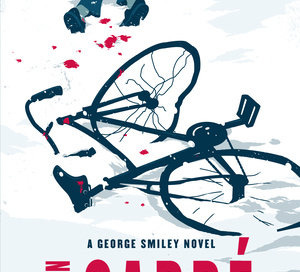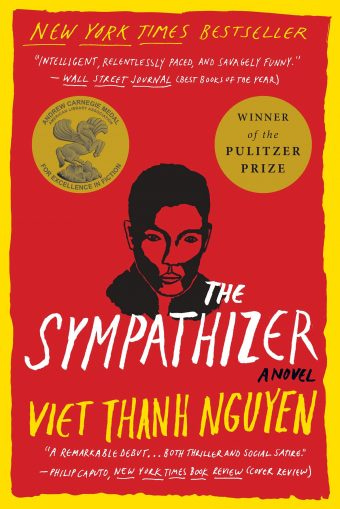Books on Espionage in the Cold War Era
Part 1: fiction spy reads that reveal a slice of the Cold War
For many people, the Cold War is synonymous with espionage. In college, I spent a lot of time thinking and writing about the Cold War. While my focus was on United States diplomatic relations, I’ve always been interested in the ways that leaders get information and make decisions. No informed decisions can be made without enough information, and during the Cold War (and beyond) decisions were made based on the collection of intelligence. Intelligence collection depends on a lot more than spies, but there is no doubt that spies hold a place of intrigue in many of our minds, especially when it comes to the Cold War. There are many books out there - fiction and non-fiction alike - that examine spies and their exploits during the Cold War, so I’ve curated a list of what I think are some of the best books out there on the subject.
I’m going to define the time period of the Cold War differently than the traditional 1945-1991 timeline, in part to fit in a few more books into this list and also because I think there is a strong argument to be made that the tensions between the Soviet Union and the United States that define our conception of the Cold War clearly existed before World War II, were present throughout World War II, and laid the foundations for the roughly fifty years to come. I’m also expanding the theater of the Cold War beyond the tensions between the United States and Soviet Union that define our traditional understanding of the conflict. The Cold War enabled and in many cases caused active proxy wars around the world that resulted in hundreds of thousands of deaths, and the collection of intelligence was crucial in all of these arenas. This diversity is reflected in the literature.
Since there were too many books to fit into one post, I am dividing the newsletter between fiction and non-fiction. Today, you will see the fiction recommendations and in the coming days I will send out the non-fiction counterparts. The following books and their reviews have been ordered in rough rough chronological order of when the story takes place, starting in 1940 England and ending in East Germany in 1989.
Fiction
Transcription - Kate Atkinson
1940-1950, England, 352 pages
Kate Atkinson is one of my favorite fiction authors. In her most recent book from 2019, Transcription, Atkinson writes about Juliet Armstrong, a young transcriptionist who is recruited by MI5 (the British domestic intelligence agency) to track British Fascist sympathizers in 1940 England. Once the war ends, Juliet takes a job at the BBC as a radio producer divorced from the world of spy-craft. When people from her past begin appearing again in her life, readers (as well as Juliet) are forced to confront her involvement in the war as the external enemy shifts from Fascist sympathizers to Communists controlled by the Soviet Union. On its own, the story is interesting and exciting. Subtly woven into the book, however, is a meditation on what happens when enemies are created through ideological differences, and the way that a hero one day can be a traitor the next.
Rating: 9/10
The Secrets We Kept - Lara Prescott
1950s, US/USSR, 368 pages
Irina is a Russian-American secretary who works for the CIA in the late-1950s. Because of her Russian skills, she is pulled from the typing pool and trained as a covert agent tasked with smuggling the newly released Doctor Zhivago by Boris Pasternak into the Soviet Union. Along the way, Irina discovers her capabilities as a covert agent that would have been confined to the secretarial pool had it not been for chance, as well as her sexuality and the barriers that this posed in a conservative, white, male dominated CIA. The book is told in alternating perspectives between Irina in the United States, and Olga, Boris Pasternak’s long-time mistress who reveals to the reader the repressive conditions in the Soviet Union in 1957 as Pasternak struggles to not only have his work published in Russian, but also to survive the state’s purges. For fans of the real Doctor Zhivago, this book gives an interesting backstory into the challenges of publication for a book deemed subversive to state interests and why it was because of this precise classification that the CIA was intent on delivering it into the arms of Russian citizens. The story is a good case study in the cultural warfare that the United States engaged in during the Cold War with the hope that access to information would cause citizens living under Communist rule to rise up and demand democracy.
Rating: 8/10
The Spy Who Came in From the Cold - John le Carré
Early 1960s, Berlin/East Germany, 240 pages
No list of books about Cold War spies would be complete without a novel from the late great John le Carré. Le Carré is considered to be the most prolific of Cold War spy novelists and is the standard against which every new Cold War spy novel is compared. Indeed, the publication reviews for many of the books in this section mention le Carré. Le Carré’s novels are unique because le Carré himself was an agent for MI6 during the early stages of the Cold War and began writing under the pseudonym “John le Carré” while he was still an agent. In this book, the protagonist, Alec Leamas is sent on a mission in East Germany to trap a high ranking official in the East German Intelligence Service. I can’t say much more or it would give away the surprises of the plot, but I can say that nothing turns out as you expect it would. The Spy Who Came in From the Cold exhibits themes present throughout many of le Carré’s other works - the dangers of confusing patriotism with morality and how this complicates the blind faith required of ordinary citizens and spies alike from their government. Through this work, le Carré questions whether the Cold War should be viewed through the traditional lens of “good” versus “evil,” and adds humanity to the bit players being used as pawns of the state.
Rating: 7.5/10
American Spy - Lauren Wilkinson
1980s, Burkina Faso/US, 320 pages
More often than not in Cold War spy stories female protagonists enter the world of espionage as converts from traditionally gendered jobs - secretaries, debutants, transcriptionists. In American Spy, Wilkinson creates a protagonist who becomes a spy because her original job as an FBI agent makes her qualified for the role. In 1986, Marie Mitchell joins a task force whose goal is to take down the Communist leaning president of Burkina Faso, Thomas Sankara. When Sankara visits New York City, Marie is used as bait in order to get information that will ultimately lead to a coup and the execution of Sankara. Sankara was a real political figure, and Wilkinson’s portrayal of him and Marie’s role in his downfall highlight the ways in which the United States attempted to influence geopolitics in countries that they feared would fall into the Soviet Union’s sphere of influence and thus harm American interests, regardless of how far or removed from America’s shores the country really was.
Rating: 9/10
The Sympathizer - Viet Thanh Nguyen
1970s-1980s, Vietnam/US, 416 pages
Winner of the Pulitzer Prize for Fiction, The Sympathizer has been a much-talked about book since it came out in 2016. The nameless protagonist is a communist double agent who travels to the United States after the fall of Saigon to collect intelligence and send it back to Vietnam, which has recently been unified by Communist forces. This story is equal parts about the protagonist’s espionage activity, his inner conflicts, and his new life in Los Angeles amongst the growing community of Vietnamese refugees. The final chapters of the book are fast paced, full of spoilers, and provide a dramatic conclusion for an incredibly well-written and well thought out book. Nguyen’s focus on an agent from Vietnam adds a unique angle to a conflict often told exclusively through the American perspective. For people who may have already read The Sympathizer, Nguyen recently released The Committed, a sequel to this book that critics are saying is even better than the first. I have not read The Committed yet, but I am looking forward to it.
Rating: 9/10

The Standardization of Demoralization Procedures - Jennifer Hofman
1989, East Germany, 272 pages
Bernd Zeiger is an East German Stasi intelligence officer who appears to be losing his mind. The author of a manual titled, unsurprisingly, “The Standardization of Demoralization Procedures,” put to use by the East German government to control its citizenry, Zeiger has spent his life and career as a cog in a nameless, faceless, all-seeing government machine. When a waitress that he frequently interacts with at a café goes missing, Zeiger becomes obsessed with finding out what happened to her - did she escape to West Berlin? or did the state take her first? As his career winds down and the only thing his reputation has to rest on is the Manual he wrote many years prior, he puts his talents to use surveilling his neighbors with the hopes of finding this waitress. It becomes clear as the story progresses that Zeiger is an unreliable narrator and the contours of his motivations shift and blur. Hofman has created a protagonist fighting against the clock of not only his own sanity, but also the existence of the East German state that has given him meaning and order his entire life. While not a traditional spy novel, Hofman writes cleverly about daily life in a country under constant surveillance and the role that ordinary citizens have in propping up the all-knowing and all-controlling state.
Rating: 8/10
Stay tuned for part two of this post on non-fiction Cold War espionage books arriving to your inbox in the coming days. Until then feel free to leave a comment below, subscribe, or share the blog.








A selection across time and the globe. Nguyen's view from in and outside the hegemon's vantage sounds particularly promising.
No Graham Greene?